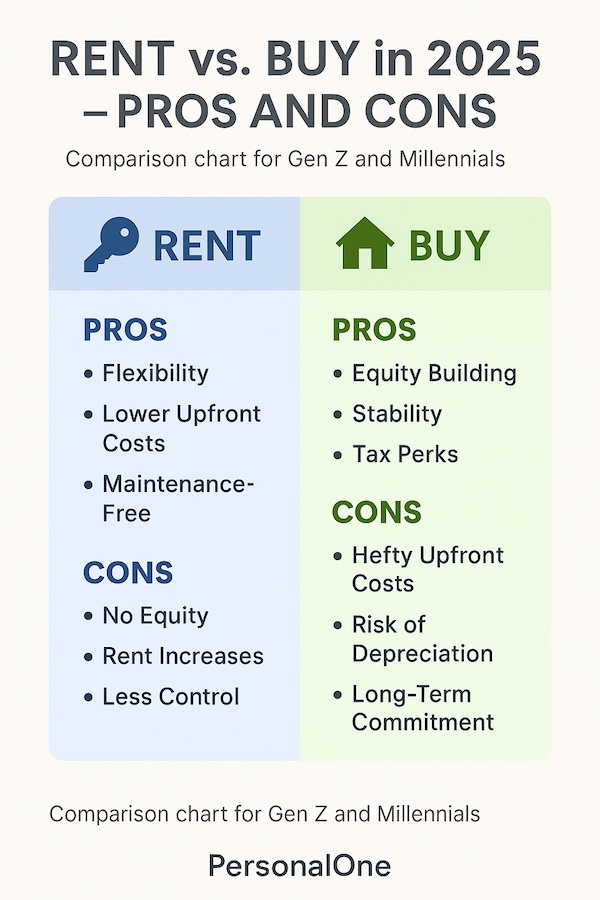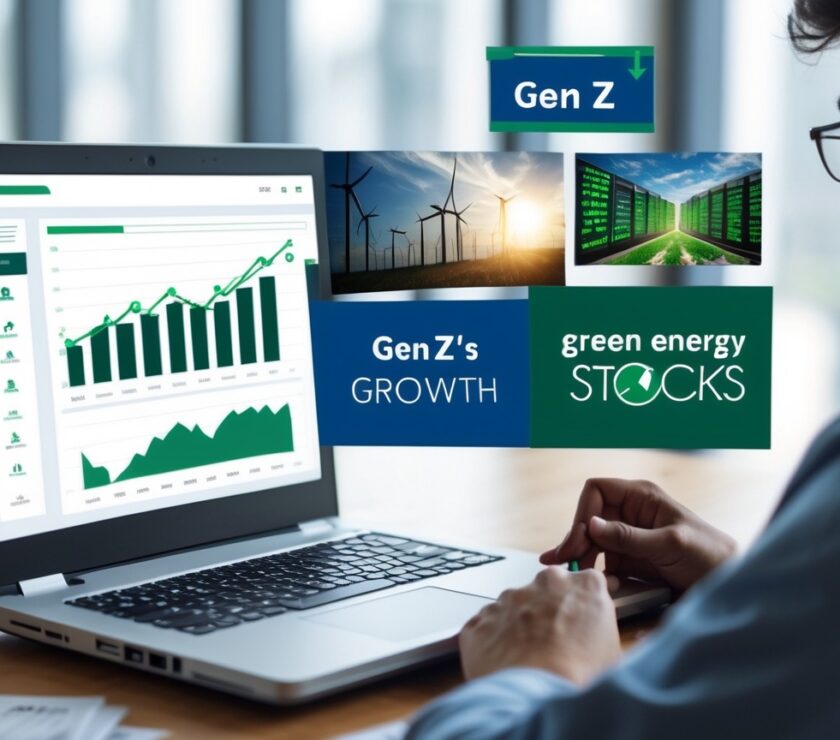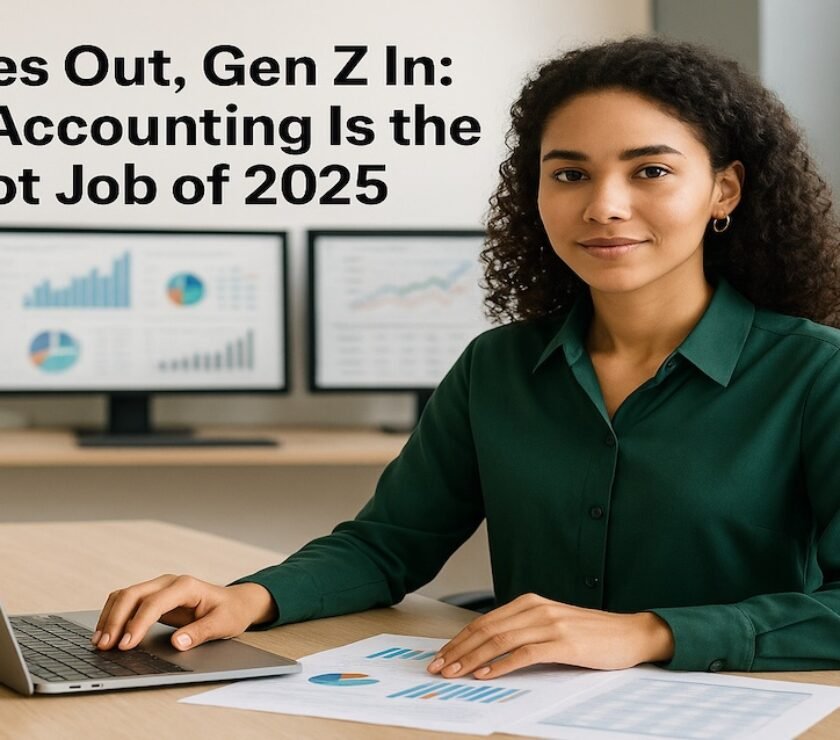The rent-versus-buy question has officially entered its messy era. Between stubbornly high home prices, interest rates that refuse to fully chill, and rents that feel criminal in some cities, the “right” answer depends more on timing, credit, and lifestyle than ever before. In 2025, this decision isn’t about tradition or pressure—it’s about flexibility, math, and where you actually want your money to work for you. Let’s break down what makes sense now, not what used to work five years ago.
The Real Rent vs. Buy Decision Facing Gen Z and Millennials
What’s the best move in 2025—rent or buy? Spoiler alert: It’s not what your parents did. As housing markets evolve faster than TikTok trends, young adults (especially Gen Z and Millennials) are caught between record-high rents and equally intimidating mortgage rates. Deciding whether to rent or buy in 2025 isn’t just about monthly payments—it’s about lifestyle, flexibility, credit score, and long-term goals.
Across the U.S., home prices have continued their rise like they’re on an energy drink. According to Zillow, the average U.S. home value hit $355,000 in Q1 2025—up nearly 6% from last year. Meanwhile, the average 30-year mortgage rate is hanging around 6.9%, and that’s if your credit is solid. But don’t start panic-Googling “how to escape capitalism” just yet—we’ve got answers.
Buying a Home in 2025: Is It Still the American Dream?
Buying a home has long been seen as the ultimate adult flex, but in 2025, it’s giving “Are you sure about that?”
Pros of Buying:
- Equity Building: Every mortgage payment you make is money in your future pocket.
- Stability: No landlord telling you not to paint the kitchen neon pink.
- Tax Perks: Mortgage interest and property tax deductions can ease the pain.
Cons of Buying:
- Hefty Upfront Costs: Down payments, closing costs, inspections—it adds up quicker than impulse buys during a midnight scroll.
- Risk of Depreciation: If you buy at the peak and prices drop, you’re stuck.
- Long-Term Commitment: Buying ties you down, which might not vibe with remote work freedom or a potential cross-country move.
Pro Tip: To even qualify for a decent mortgage in 2025, you’ll need a credit score north of 700. If yours is more “meh” than “marvelous,” read our guide: Boost Your Credit Score 100 Points—No Credit Expert Needed.
Renting in 2025: Financial Fumble or Smart Move?
Now, here’s where it gets spicy. Renting, often dismissed as “throwing money away,” might actually make more sense in 2025, depending on your goals.
Pros of Renting:
- Flexibility: Want to move cities next year? Renting won’t hold you hostage.
- Lower Upfront Costs: First month, last month, and a deposit = way less than a down payment.
- Maintenance-Free: Your landlord, not you, fixes the broken AC in July.
Cons of Renting:
- No Equity: Your payments don’t build ownership.
- Rent Increases: Some cities are experiencing annual hikes of 10%+.
- Less Control: No pet giraffes. No remodeling your bathroom into a spa.
According to Apartment List, the national median rent is $1,396 in early 2025—down slightly from 2024 but still higher than pre-pandemic prices. In urban areas like NYC or LA? Expect $2,500+.
Credit Impact: Renting vs. Buying
This blog lives in the Credit category for a reason.
- Buying a home usually requires a great credit score and impacts it long-term—positively if you make payments on time, disastrously if not.
- Renting doesn’t build credit unless you use rent-reporting services like RentTrack or Experian RentBureau.
Gen Z and Millennials can use these tools to turn their rent payments into credit-building opportunities, giving them better odds at homeownership later. Win-win.
What Should Gen Z and Millennials Actually Do?
Here’s your no-fluff checklist:
Buy If:
- You have a stable income and emergency fund.
- You plan to stay in one place for 5+ years.
- Your credit score is 🔥 (700+).
- You’re ready to maintain a home.
Rent If:
- You want flexibility or plan to move soon.
- You’re still building your credit.
- You don’t have enough saved for a down payment.
- Your local rent is cheaper than buying monthly.
Use this Rent vs. Buy calculator to run the math on your situation.
Rent vs. Buy in 2025 – Pros and Cons
Final Thoughts: So… Rent or Buy in 2025?
There’s no one-size-fits-all answer. But one thing’s for sure: if your finances aren’t aligned, buying can feel more like a trap than a dream. Renting isn’t failure—it’s flexibility. Renting may offer the freedom to build credit, invest elsewhere, and live life on your terms.
Bottom line? In 2025, the “smart move” is the one that fits your lifestyle, not someone else’s idea of succes
Call to Action
Drop a comment below—are you Team Rent or Team Buy?
👇 Like, share, or send this to your roommate who’s “totally buying next year.”
Timestamp
Last Updated: May 10, 2025
Financial Disclaimer
This article is for informational purposes only and should not be considered financial advice. Consult a licensed professional before making real estate decisions.
Sources:
Is It a Good Time to Buy a House
FAQ
Should I buy a home in 2025 or wait?
If you have a stable job, good credit, and savings, buying might make sense. But waiting could be smarter if interest rates drop or housing prices cool.
Is renting a waste of money in 2025?
Not necessarily. Renting offers flexibility, lower upfront costs, and can even help you build credit with the right tools.
How does my credit score affect home buying?
A high credit score lowers your mortgage interest rate and improves loan approval chances. Aim for 700+ for the best terms.
Can renting help me build credit?
Yes! Use rent-reporting services like RentTrack or Experian RentBureau to add your rent history to your credit profile.





